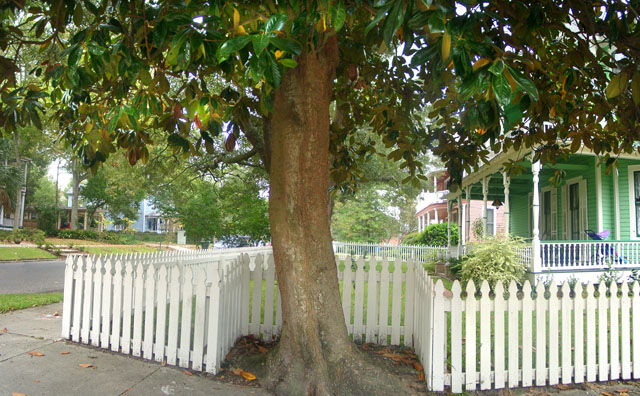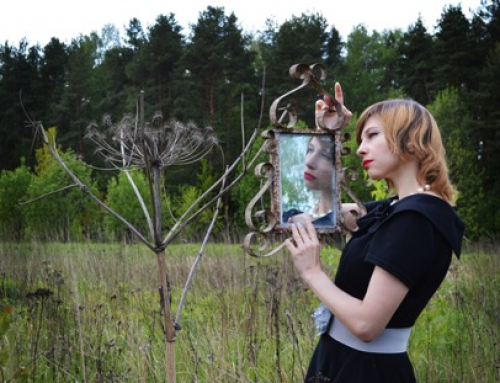Inside the carefully packed cardboard box was: soup in Tupperware, homemade salad dressing, mixed field greens and a frozen apple crisp. The package was really a box full of concern and caring for a family in the neighborhood who had experienced more than their share of tragedy in the last few years. The latest misfortune being a serious car accident involving the husband/father.
I struggled to close the service door on our garage because my arms were too short to reach beyond the box and grab the knob. I precariously pressed the box against the siding with my chest as I reached out with my hand to secure the door. The soup in the Tupperware is one of those simmer-all-day recipes that I make once in a blue moon. I said a little prayer to help me avoid spilling the precious cargo all over the driveway. Catastrophe avoided.
I cut across our lawn and headed toward the neighbor’s house. I glanced up into the dense grey sky. Beneath the melancholy clouds and to the right of my destination, another disastrous scene took my breath away. Only two weeks ago, a home in the neighborhood had burned down. No one was hurt in the fire, but the house was a total loss. The remaining jagged black ruins both reached for the sky and crumbled toward the earth. I remembered how my seven-year old daughter had half-jokingly said, Our neighborhood is cursed.
Air Bags, Security Systems and Tax Shields Can’t Protect You from Personal Pain
As I approached the tall and elegant front doors of the house where the soup was going, I noted the perfectly tasteful fall wreaths hanging from copper hangers on the doors. Five or six pumpkins graced the lawn, perfectly spaced between the landscaping. From the outside, all was well.
Tragedy seems incongruous in a subdivision where everyone has it all. Nuclear families live in custom homes with manicured lawns and hybrid SUVs. This is the end of the rainbow, the jackpot, and yet it is still completely vulnerable to misery.
What is the purpose of suffering? Why is it so indiscriminate and widely distributed?
Getting to the true self or soul is so very difficult. We have to be cracked open to allow our vulnerable heart to be exposed. The two most direct ways to the soul? Love and suffering. Love appears to be the easy route with its inspiring lilt and joyful expression, but love and suffering are two sides of the same coin. Who has not been hurt by a loved one or felt heartache when someone we care about is in pain?
The soul is prompting us all the time with gut feelings and risk-taking urges but most people (me included) ignore it by giving in to distraction, telling themselves they should be content with what they have, and doing external work.
Suddenly, tragedy strikes and all the things on the outside don’t matter. There is internal work to be done. Pay attention.
I’ve read about cancer patients who never felt more alive than after they were diagnosed with the disease. Suddenly, What do you love? became the only important question. They were free of conformity and fears. Cancer allowed them to remove the static in their existence and tune in to a clear channel of love and freedom.
The truth is, if you asked me to choose between winning the Tour de France and cancer, I would choose cancer. Odd as it sounds, I would rather have the title of cancer survivor than winner of the Tour, because of what it has done for me as a human being, a man, a husband, a son, and a father.
~ Lance Armstrong
Moving On
The day after the house burned down in our community another neighbor mentioned that the family had barely made it out of their home before the windows exploded from the heat. The fire took place in the wee hours of the morning so the family escaped with nothing but the pajamas on their backs. No material goods to their possession. I pondered that for a while. I wondered what they would buy first besides clothing. Where do you start? What is vital and what is significant? What do you love?
In his book, Kinds of Power, James Hillman discusses a framework for finding your true self. One of the five different areas to be included in personal growth is shedding. Hillman says shedding takes place after the worst catastrophic life events. Divorce, death, illness, loss of job all qualify. These events are painful to say the least, but what happens afterward is life-changing. Those individuals who are able to shed the event; move on with an enhanced love and care for themselves and all those who are in their lives, are the ones who avoid depression and embrace the day-to-day gift of living. Their lives have a deeper honesty and vitality. A truth.
Shedding is extremely difficult. It is much easier to suffer.
I’ve felt despair and know how deep and dark the hole is. I would never want to trivialize either sad event. Both the fire and the automobile accident will not be forgotten or justified. But there is a hope that the families will be able to move on with a deep love and care for themselves and the precious others in their world. May life seem even more poignant. May they listen to the soul and consistently ask themselves, What do I love?
The Human Connection
I turned over the box of goodies to the grandma of the family whose husband/father had been in the car accident. We held hands for a bit as we discussed how the family was handling the upheaval and stress. In that physical touch a transfer of sadness, strength and knowing occurred. A knowing that emotional pain cuts you to the quick, forces you to ask for help, and could happen to you. Grandma and I were two strangers connected by suffering and caring. We spoke softly and discreetly about the accident. The four-year old daughter stuck closely and quietly to Grandma’s legs.
We spoke of the extended support from friends in the area. Like many in our neighborhood, this particular family is a transplant. They have no relatives in the area. The call for help came over Facebook and frantic texts. Many, many answered the call. We all were a little cracked open by their tragedy. We were all asking ourselves, What really matters? Who are we behind our wreath-covered doors?
A Poignant Reminder
When I returned home I easily maneuvered through the garage service door, hung up my jacket and walked straight back to my writing space. On the desk burning a steady peaceful flame was the candle I had lit an hour before I left to deliver the food. The fire was contained within the candle’s glass jar but could have been another unfortunate disaster if I had not returned when I did. Catastrophe avoided…for now.
What have you learned from times of trouble? How has personal pain changed you for the better?








[…] Love Thy Neighbor As Thyself: When Tragedy Brings Clarity (space2live.net) Advertisement Eco World Content From Across The Internet. Featured on EcoPressed OM in the News: Water as a Sustainability Issue Rate this: Share this:SharePrintEmailTwitterStumbleUponFacebookRedditLinkedInDiggLike this:LikeBe the first to like this post. Filed under Thoughts from the Porch and tagged 1Thessalonians 5:11, Breast cancer, Cancer, Christian Encouragement, Conditions and Diseases, encouraging others, God, God's Love, Health, Heavenly Father, Martina, Martina McBride, Prayer, Psalm, Psalm 23, Sharing Christ | Leave a comment […]
In tune with keeping the inner peace, I had to miss my Monday morning meditation group today. I managed a 20 minute meditation as I would do in group meditation. At home, usually, I can’t make it past ten. I lit a candle as we do in meditation. I only use it as a focal point when I can’t even focus on my breathing. Breathing is my baseline. The intensity of the flame somehow snaps me back to it immediately. I also read from my daily meditation book at the beginning because I couldn’t relax. I had suddenly realized that I was missing the reading the facilitator does in the beginning each week. The repetition of all this brought back some of my inner peace. I also feel like it will prevent me from falling back into my pattern of dreading the 20 meditation back in group next week. Something in my body says so.
When I first read this, I had no positive feelings at all because I sometimes swing from one item of trouble to the next no matter how hard I try to prevent it. I thought that there has to be good along the way, so I stopped to think about it.
Times of trouble have given me a higher level of empathy and compassion for others going through their issues. It has taught me that no one’s troubles are less than another’s. It’s all relative to each individual’s life.
It has taught me to enjoy the people I see everyday but not to get caught up in the politics. I’m learning more and more to spend my time developing and enjoying the friends that are true and I appreciate the most. The ones to give to me naturally…without even trying and make me want to reciprocate.
I have also learned to try to find inner peace. I’m slow but steady on the path. I’ve been in a meditation group and though I’ve a long way to go, it has done wonders for my way of thinking with a bit more patience. The calm it has given me is most likely not visible to others, it is to me. I used to dread my meditation group’s first 20 to 25 minutes of meditation…so long. After our summer break, I look forward to immersing myself in that peaceful time. I’ve always enjoyed the discussions on given topics afterwards. I also read articles, day books, and books that keep me in touch with my journey to inner peace. Lastly, friend’s with a search for inner peace, I feed from them in my journey.
Troubled times do seem to make empathy and compassion easier to access. We have a deeper knowing of the pain others are going through. I envision two hearts lighting up (like E.T.’s;), when people who have been through tough times meet up and allow their guards to come down. There is a mutual understanding that is priceless.
I have also tried to find calm within myself. Inner peace leads to outer peace. It’s a journey, like you said. It’s not a feeling that stays once you achieve it once. Darn! 😉 It takes persistent mindfulness. So hard to do in a chaotic world. Congratulations to you Debbi for being so aware. Thanks for commenting!